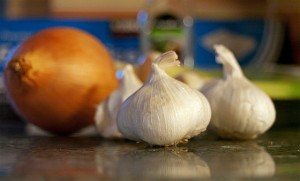 Onions (Allium cepa) are garlic (Allium sativum) have been used as healing foods in traditional medicine going back thousands of years. The therapeutic value of onions and garlic, as well as other related allium vegetables, was known to the Egyptians. Many important studies have been reported on the healing properties of garlic, mainly in Eastern literature. Western scientists are becoming more interested in these traditional foods because they may be protective of cancer. For example, a study published in the American Journal of Clinical Nutrition in 20061, used data from across Europe to determine the relationship between cancer and consumption of onions and garlic. The results suggested that there is an inverse association between the frequency of onion consumption and the risk of colorectal, laryngeal, ovarian, oral and oesophageal cancers; and garlic consumption and all cancer except breast and prostate.
Onions (Allium cepa) are garlic (Allium sativum) have been used as healing foods in traditional medicine going back thousands of years. The therapeutic value of onions and garlic, as well as other related allium vegetables, was known to the Egyptians. Many important studies have been reported on the healing properties of garlic, mainly in Eastern literature. Western scientists are becoming more interested in these traditional foods because they may be protective of cancer. For example, a study published in the American Journal of Clinical Nutrition in 20061, used data from across Europe to determine the relationship between cancer and consumption of onions and garlic. The results suggested that there is an inverse association between the frequency of onion consumption and the risk of colorectal, laryngeal, ovarian, oral and oesophageal cancers; and garlic consumption and all cancer except breast and prostate.
The exact reason that allium vegetables are protective of certain forms of cancer is unknown. However, researchers have highlighted a number of compounds that may be responsible for their health benefits. Garlic contains a large number of chemicals such as allin, ajone and cycloallin. Crushing or cutting garlic converts these compounds into organosulfur compounds such as diallyl sulfide (DAS), diallyl disulfide (DADS) and diallyl trisulfide (DAT). These organosulfur compounds are responsible for the strong smell and taste associated with all allium vegetables. Garlic also contains a number of vitamins and minerals that may confer therapeutic properties. Onions contains similar organosulfur compounds which are released on crushing. In addition, onions contain quercetin, a flavonol. Quercetin is a good reducing agent which suggests it is capable of scavenging free radicals. Quercetin has also been shown to inhibit inflammation.
A growing body of research is suggesting that garlic and onions have some very useful health protecting properties. Including the relevant cancer protective agents in the diet would therefore be a sensible step on the journey to optimum nutrition. However, the exact chemicals that confer these effects are not know. Garlic extract and quercetin are both available in tablets or capsules and both have been shown to have beneficial effects on certain parameters of health in research. In spite of this, it is recommended that the whole allium vegetables are used liberally in cooking to ensure the entire spectrum of beneficial chemicals are present in the diet. Aged garlic extract is the form used frequently in studies and if supplements are chosen, this is the form that should be considered first as it has proven beneficial effects and the chemical composition is well documented.
RdB
